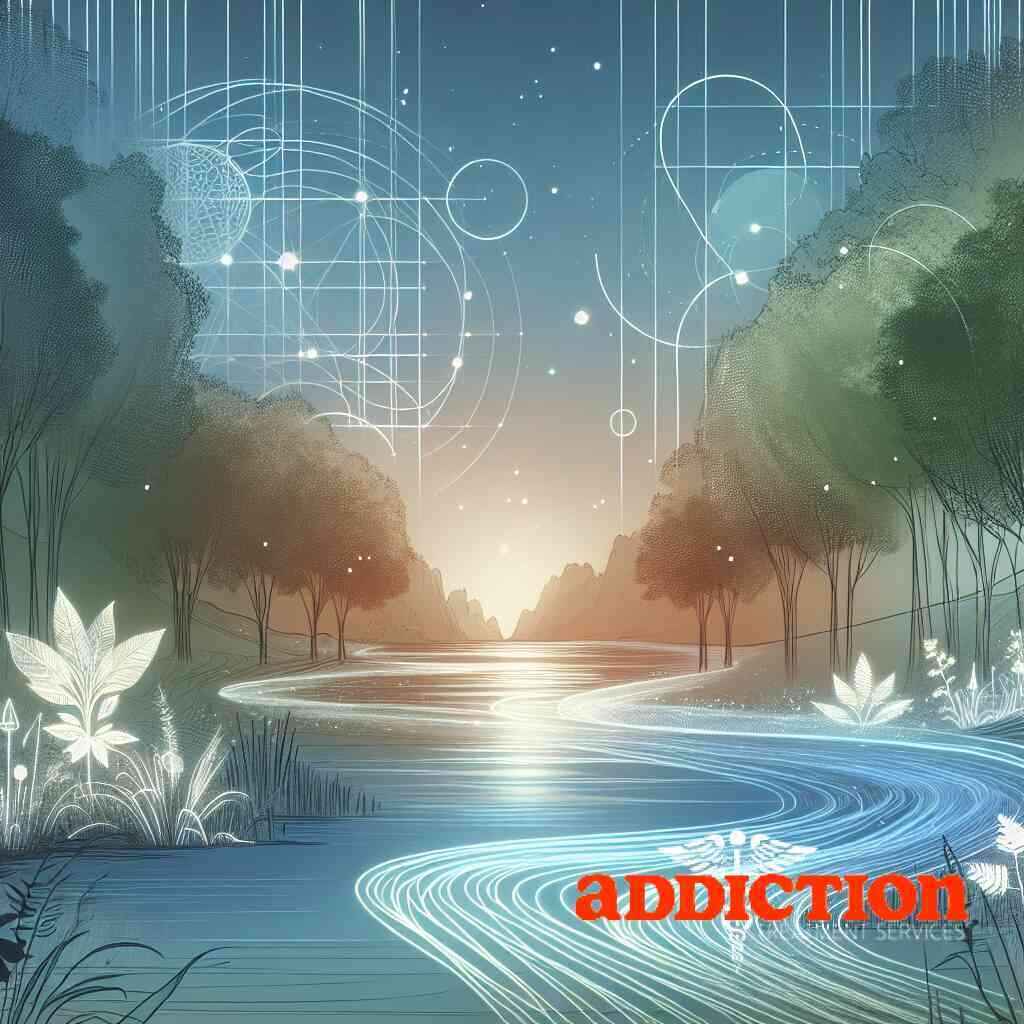 Posted On: 06/04/2024
Posted On: 06/04/2024Navigating Through Recovery with Technology
The role of digital health in addiction recovery
In today’s rapidly advancing world, digital health initiatives are playing a pivotal role in transforming the landscape of addiction recovery. The emergence of recovery apps for addiction signifies a leap towards accessible, immediate support, catering to individuals battling substance use disorders. These digital tools are designed with the user’s privacy and need for support in mind, offering a blend of therapy sessions, peer support networks, and educational resources at one’s fingertips. By integrating addiction treatment services overview, these apps provide a bridge between traditional treatment methods and modern, technology-assisted strategies, making the first step towards recovery less intimidating.
How technology enhances the recovery process
Technology, through its innovative applications, enhances the recovery process by offering personalized, on-demand solutions that adapt to the unique journey of each individual. Features such as tracking sobriety milestones, providing motivational support through peer networks, and offering meditation and mindfulness exercises address various aspects of addiction recovery. These functionalities not only assist in relapse prevention but also encourage a holistic approach towards sobriety, addressing mental health alongside substance use disorders. The synergy between mobile apps for sobriety and traditional addiction treatment services ensures a comprehensive care model, fostering a supportive ecosystem for recovery.
Embracing mobile resources for substance abuse
Embracing mobile resources for substance abuse marks a significant shift in how individuals access support and resources. The convenience and accessibility of such tools empower those in recovery to take control of their journey, with the ability to reach out for help, track their progress, and access educational content anytime, anywhere. This democratization of access breaks down barriers to treatment, making it easier for family members and the individuals themselves to find addiction recovery services near them without the fear of stigma or the constraints of geographical limitations. Through the integration of technology into the recovery process, individuals are better equipped to manage their addiction, paving the way for a sober tomorrow.
1 – Sober Grid: Your Social Support Network
Facilitating peer support for addiction
In the journey toward recovery, having a supportive community can significantly influence one’s ability to stay sober. Sober Grid is an app designed to offer exactly that-a social network for individuals looking to achieve or maintain sobriety. This platform caters to those struggling with substance use disorders, providing a safe space to connect, share experiences, and offer support. Utilizing the find addiction recovery services near me feature ensures that users not only bond over shared challenges but also navigate the path to wellness together, reinforcing the principle that no one should face recovery alone.
Features: Anonymity, peer motivation, and global connectivity
Sober Grid sets itself apart with features emphasizing anonymity, peer motivation, and the ability to connect with a global community. The app respects the privacy of its users, allowing them to share their journey with as much or as little personal disclosure as they prefer. Through features like the “Burning Desire” button, which signals the community when a member is in need of immediate support, to daily motivational prompts and success stories, Sober Grid fosters an environment of encouragement and mutual understanding. This global connectivity ensures that no matter where you are, you can find support at your fingertips, making the process of recovery less isolating.
Integrating Sober Grid with your recovery journey
Incorporating Sober Grid into your recovery journey can be a transformative step towards maintaining sobriety. By engaging with the app, users can track their sober days, celebrate milestones, and access a wealth of resources tailored to their recovery needs. Additionally, the app’s capability to connect individuals with local and online meetings, including Alcoholics Anonymous meetings search, translates to an invaluable tool for sustaining recovery. Whether you are taking the first step towards sobriety or looking to strengthen your long-term recovery, Sober Grid provides a dynamic platform to support your path to wellness, integrating seamlessly with both traditional and digital health in addiction recovery strategies.
2 – I Am Sober: Tracking Your Sobriety Milestones
Using the app to monitor progress and set goals
I Am Sober is a comprehensive app designed to help individuals in their journey towards sobriety by enabling them to monitor their progress meticulously and set achievable goals. This digital tool stands out by encouraging users to make daily pledges of sobriety, turning each day into a commitment towards their recovery. By logging their sober days, users can see at a glance how far they’ve come, which can be incredibly motivating. Additionally, the app allows for customization of milestones and the setting of personal goals, fostering a sense of accomplishment as each target is met. With the top addiction recovery apps for 2024 article, I Am Sober is highlighted for its user-friendly interface and impactful features that make it a valuable asset in the addiction recovery arsenal.
How daily pledges strengthen resolve
The daily pledge feature of I Am Sober acts as a powerful tool to strengthen an individual’s resolve in staying sober. Each morning, users are prompted to commit to their sobriety for the day ahead. This process instills a sense of accountability and mindfulness, reminding individuals of their dedication to recovery every single day. By acknowledging this commitment daily, users build a routine that supports their sobriety goals, reinforcing their decisions to stay sober. Moreover, the app provides inspirational quotes and success stories, further bolstering the user’s determination to continue on their path to recovery. This aspect of I Am Sober emphasizes the importance of daily intentions, making each day a significant step towards long-term sobriety.
The importance of measuring success in recovery
Measuring success in recovery is crucial, as it provides tangible evidence of progression and personal growth. I Am Sober offers a unique feature that allows users to visually track their sobriety streaks, view saved money, and acknowledge the time regained by staying sober. This quantification of success serves not only as a motivational tool but also as a reflective one, giving individuals insight into the positive changes resulting from their sobriety. Celebrating milestones, no matter how small, is key to building self-esteem and resilience in the face of challenges. The app’s focus on measuring success underpins the idea that every moment of sobriety is an achievement worth recognizing, empowering individuals to cherish and strive for continued progress in their recovery journey.
3 – Headspace: Meditation for Mental Wellness
Meditation as a tool for managing withdrawal symptoms
Meditation has emerged as a potent tool in managing withdrawal symptoms, a crucial aspect highlighted in holistic recovery insights in Washington. Headspace, with its user-friendly approach to mindfulness, offers guided meditations specifically designed to alleviate the physical discomfort and mental unrest that often accompany the early stages of addiction recovery. By focusing on breathing and mindfulness exercises, individuals can navigate through anxiety, stress, and cravings, reducing the intensity and frequency of withdrawal symptoms. This process not only aids in managing the present discomfort but also equips users with long-term coping mechanisms, fostering resilience against future challenges.
Building a routine with Headspace for holistic recovery
Incorporating Headspace into a daily routine can significantly enhance holistic recovery efforts. Starting or ending the day with guided meditation can help set a positive tone, encouraging a mindset of sobriety and well-being. The app’s structured programs, which include sessions on stress reduction, sleep improvement, and emotional management, offer a scaffolded approach to wellness. This consistency not only cultivates a sense of stability but also reinforces the commitment to sobriety. By prioritizing mental wellness alongside physical health, individuals can achieve a more balanced and fulfilling recovery, underlining the importance of addressing all aspects of well-being in the journey towards lasting sobriety.
The science behind mindfulness in addiction recovery
The efficacy of mindfulness in addiction recovery is backed by a growing body of scientific research. Studies have shown that regular meditation practices, such as those offered by Headspace, can alter neural pathways and increase the density of gray matter in areas of the brain associated with self-regulation, decision-making, and emotional control. These changes can significantly impact an individual’s ability to manage impulses, reduce stress levels, and foster a greater sense of self-awareness-critical factors in overcoming substance use disorders. By integrating mindfulness into their recovery process, individuals are not only working towards sobriety but also fundamentally transforming their approach to challenges, emotions, and life itself, laying the groundwork for a healthier, more mindful existence.
4 – Quit That! App: Overcome Any Addiction
A versatile tracker for various addictions
In the landscape of recovery apps for addiction, Quit That! stands out with its versatility in tracking a broad spectrum of addictions. Whether users are struggling with substance abuse, behavioral addictions, or looking to quit unhealthy habits, this app offers a user-friendly platform to monitor progress. By being able to log multiple habits or substances simultaneously, users gain a holistic view of their recovery journey. The app’s simplicity does not overshadow its effectiveness,it provides a tangible way to see the cumulative success of being sober, whether from alcoholic beverages, drugs, or any other compulsive behaviors that individuals aim to overcome.
Customizing your recovery path with Quit That!
Customization is key in the recovery process, as each individual’s journey is unique. Quit That! empowers its users to personalize their recovery path extensively. From setting specific quit dates for each addiction to tailoring motivational messages that resonate personally, the app ensures that every aspect of the recovery process is aligned with the user’s needs and goals. This level of personalization not only enhances the user’s engagement with their recovery efforts but also helps in establishing a meaningful connection with the process itself. By incorporating methodological detoxification strategies and monitoring, Quit That! serves as an invaluable companion in managing withdrawal symptoms and tracking progress toward a sober lifestyle.
Celebrating sobriety and the journey to addiction treatment near you
Celebrating milestones is a crucial part of the recovery process, and Quit That! facilitates this beautifully. The app encourages users to acknowledge every victory, big or small, reinforcing the positive impact of their decisions to remain sober. It quantifies achievements in tangible ways, such as the amount of money saved or the time reclaimed, providing users with a powerful visual reminder of their progress. Furthermore, for those seeking additional support, Quit That! acts as a bridge, guiding users to addiction treatment services near you, including intensive outpatient programs, and residential treatments. Recognizing the importance of celebrating these milestones not only aids in self-validation but also motivates individuals to continue their path to recovery with confidence and determination.
5 – Talkspace: Online Therapy and Counseling
Accessing professional mental health services remotely
The digital era has revolutionized the way we approach mental health, making services like Talkspace a cornerstone in the realm of addiction recovery. Talkspace enables individuals to access professional mental health services remotely, breaking down the barriers of traditional in-person therapy sessions. This platform connects users with licensed therapists who specialize in a range of issues, including substance use disorders. By offering flexibility and convenience, Talkspace ensures that help is available anywhere, at any time, aligning with the needs of those who may have hectic schedules or prefer the anonymity of online counseling. With the advancements in technology, mental health center resources have expanded to include digital platforms like Talkspace, broadening the scope of accessible support for recovery.
The role of therapy in treating substance use disorders
Therapy plays a critical role in treating substance use disorders by addressing the underlying causes of addiction, such as trauma, anxiety, and depression. Through platforms like Talkspace, individuals in recovery have the opportunity to explore these issues in a safe and supportive environment. The therapeutic process aids in developing coping strategies, enhancing emotional regulation, and fostering a deeper understanding of the patterns that contribute to substance misuse. The integration of therapy into addiction treatment services amplifies the chances of sustained recovery by equipping individuals with the tools needed for emotional resilience and healthy decision-making. Moreover, the flexibility of accessing therapy sessions via Talkspace breaks down the usual constraints, making it a valuable asset in the journey toward wellness.
Integration with addiction treatment services for comprehensive care
Integrating online therapy and counseling services like Talkspace with traditional addiction treatment services creates a more comprehensive care approach. This synergy ensures that individuals receive a well-rounded treatment plan that addresses both the physiological and psychological aspects of addiction. Talkspace’s integration with addiction treatment services facilitates a continuum of care, allowing for seamless communication between therapists and other healthcare providers involved in an individual’s recovery process. This collaborative approach enhances the effectiveness of treatment programs, offering a more personalized and holistic recovery experience. For those seeking solutions, resources like addiction treatment services in California provide a gateway to various options, ensuring that the path to recovery is tailored to the unique needs of each individual. The digital convenience combined with traditional care fosters a nurturing environment conducive to healing and long-term sobriety.
Choosing the Right App for Your Recovery
In the landscape of recovery apps available in 2024, selecting one that aligns with your specific needs is crucial. Whether you’re navigating the pitfalls of alcohol addiction or striving to overcome substance misuse, the right app can offer a lifeline, enhancing your journey toward sobriety. This section delves into considerations for evaluating apps tailored to alcohol recovery, features pivotal for drug addiction recovery, and underscores the critical need for privacy and support within these platforms.
Evaluating apps for alcohol recovery
When seeking out an app to assist with alcohol recovery, it’s essential to choose one that offers comprehensive features tailored to the unique challenges of overcoming alcohol addiction. Look for an app that provides not just tracking capabilities but also educational resources about psychoactive drug information, which can provide insight into how alcohol affects the brain and body. Integration with local resources, such as access to addiction treatment services in Florida, can also be invaluable, offering a path to additional support when necessary. Furthermore, apps that encourage community interaction through forums or support groups can offer the peer encouragement needed to maintain sobriety.
Identifying effective features for drug addiction recovery
For individuals focused on drug addiction recovery, the most effective apps are those that cater to the multifaceted nature of substance abuse. Features such as progress tracking, motivational alerts, and the ability to create a personalized recovery plan are fundamental. Equally important are applications that provide links to Narcotics Anonymous Meetings finder, enabling users to find and attend local or virtual meetings. Additionally, having access to a database of articles and the latest research, including information on treatment modalities and insights from roles of mental health professionals, can empower users with knowledge. An app that combines these features offers a robust toolkit for tackling the challenges of drug addiction recovery.
The importance of privacy and support in addiction help apps
Privacy and support are the cornerstones of any addiction help app worth its salt. Users must feel secure in the knowledge that their personal information and recovery journey are protected. An app that prioritizes user anonymity and data security encourages more honest engagement with the available resources, from tracking sobriety milestones to participating in community forums. Support extends beyond digital encouragement,apps that facilitate connections to real-world resources, such as providing contact information for addiction help, are instrumental. This duality of privacy and support ensures that individuals in recovery have a safe, supportive environment to turn to, mirroring the confidentiality and understanding found in traditional therapy or support groups.
In conclusion, the path to selecting the right recovery app involves careful consideration of your specific recovery needs. Whether it’s an app that specializes in alcohol recovery, one that provides comprehensive tools for drug addiction, or a platform that ensures privacy and robust support, the goal is to find an app that best supports your journey toward lasting sobriety.
Harnessing Technology for a Sober Tomorrow
The Future of Addiction Recovery Apps
The digital landscape of addiction recovery is evolving at an unprecedented pace, promising a future where technology plays a central role in supporting those on the path to sobriety. As we look ahead to the future, addiction recovery apps are expected to leverage emerging technologies like artificial intelligence (AI) and machine learning to offer even more personalized and adaptive support. These advancements will likely include predictive analytics to identify potential relapse triggers and tailor interventions in real-time, enhancing the efficacy of digital health in addiction recovery.
Furthermore, the integration of virtual reality (VR) and augmented reality (AR) into recovery apps could revolutionize exposure therapy, allowing users to navigate and practice coping strategies in a controlled, virtual environment. By simulating real-life scenarios where relapse might occur, individuals can gain confidence in their ability to maintain sobriety in challenging situations. This seamless blend of innovative technology not only enriches the user experience but also reinforces the commitment to recovery, making the journey less daunting.
Bridging the Gap: From Mobile Apps to Real-World Recovery
While mobile apps have significantly enhanced the accessibility of recovery resources, the next step in technological advancement lies in bridging the digital world with real-world recovery processes. This means creating a cohesive ecosystem where mobile apps act as conduits, connecting users to the broader spectrum of addiction treatment services, from local support groups to professional counseling and residential treatment centers. The goal is to ensure that individuals can effortlessly transition from digital platforms to in-person care, based on their unique needs and recovery stages.
To achieve this, recovery apps will increasingly integrate features that enable real-time communication with healthcare providers, schedule face-to-face therapy sessions, and locate the nearest support meetings. These integrations will provide a holistic approach to recovery, ensuring that users have access to comprehensive care beyond the screen. The amalgamation of digital convenience with traditional support systems promises a future where recovery journeys are more supported, holistic, and tailored to individual needs.
Maintaining Sobriety with a Combination of Apps and Treatment Facilities
The journey to sobriety is multifaceted, requiring a combination of personal will, community support, and professional guidance. Recognizing this, the future of addiction recovery will likely see a more integrated approach, combining the strengths of mobile apps with the resources available at treatment facilities. By leveraging apps to track progress, manage triggers, and access self-help tools, individuals in recovery can maintain a constant connection to their sobriety goals, even outside the structured environment of treatment facilities.
Moreover, treatment centers are beginning to recognize the value of incorporating digital tools into their programs, providing clients with app recommendations that complement their therapy and aftercare plans. This dual approach ensures continuous support throughout the recovery journey, bridging any gaps that might exist between outpatient treatment sessions or after leaving a residential facility. The integration of technology into the fabric of addiction treatment heralds a new era of recovery support, one that embraces innovation to empower individuals on their path to sobriety.
The advancement and integration of recovery apps in the addiction treatment landscape present a promising horizon. By combining the personalized, flexible support offered by apps with the comprehensive care provided by traditional treatment services, individuals navigating the journey of recovery have stronger, more accessible tools at their disposal than ever before. As technology continues to evolve, so too will the ways in which we support those seeking to overcome addiction, leading to a future where recovery is a well-supported, attainable goal for anyone in need.
Frequently Asked Questions
Question: How does Addiction Treatment Services integrate with apps like those mentioned in ‘Top 5 Recovery Apps for Addiction in 2024’?
Answer: At Addiction Treatment Services, we leverage the power of technology to enhance the recovery process. By integrating with premier recovery apps for addiction, such as those highlighted in the ‘Top 5 Recovery Apps for Addiction in 2024’, we provide our clients with a comprehensive approach to addiction treatment. Our directory includes addiction treatment centers that offer both traditional and modern, technology-assisted addiction recovery strategies, ensuring that whether you’re using sobriety apps, meditation apps for recovery, or mobile resources for substance abuse, you have access to a fully supportive ecosystem for your journey toward sobriety. This blend ensures a seamless transition between digital support and real-world, professional treatment, optimizing the recovery journey.
Question: Can Addiction Treatment Services recommend specific addiction help apps tailored to an individual’s unique recovery needs?
Answer: Absolutely, at Addiction Treatment Services, understanding that each journey to recovery is unique is at the core of our mission. Our comprehensive directory and expertise enable us to recommend the best recovery apps for addiction, tailored to meet the specific needs of each individual we support. From apps for alcohol recovery to substance abuse recovery apps, we ensure that the digital health tools suggested complement the addiction treatment services, whether it be outpatient treatment, residential treatment, or medication-assisted treatment, available through our network. Our dedicated professionals are always ready to guide you to the top addiction treatment apps, including mental health and addiction apps, ensuring you receive holistic support that addresses both substance use disorders and any accompanying mental health conditions.
Question: How does Addiction Treatment Services stay informed about the latest digital health for addiction trends, such as the top recovery apps for 2024?
Answer: Addiction Treatment Services is committed to staying at the forefront of trends in technology in addiction recovery. Our team continuously researches and assesses the latest digital offerings, including the best recovery apps for 2024, ensuring that we are well-informed about the innovative tools that can benefit our clients. We maintain partnerships with technology developers and participate in industry conferences, in addition to conducting our own in-depth analyses of the peer support apps for addiction and holistic recovery apps available. This dedication allows us to integrate cutting-edge digital health for addiction strategies with traditional treatment methods, offering a comprehensive and effective approach to recovery.
Question: What criteria does Addiction Treatment Services use to evaluate the efficacy of sobriety apps and technology-assisted addiction recovery tools?
Answer: At Addiction Treatment Services, we evaluate sobriety apps and technology-assisted addiction recovery tools based on several critical criteria to ensure they meet the high standards of care we uphold. Our evaluation process includes assessing the app’s ability to provide personalized support, its user-friendliness, privacy and security measures, the credibility of its content, and the effectiveness of its engagement strategies for relapse prevention. We also consider user reviews and clinical research supporting the tool’s efficacy. By doing so, we ensure that the digital tools we recommend, from addiction counseling apps to tracking sobriety apps, are not only innovative but also safe, effective, and supportive of the holistic recovery process.
Question: How do mobile apps for sobriety complement the treatment programs offered by Addiction Treatment Services?
Answer: Mobile apps for sobriety are designed to complement the comprehensive treatment programs offered by Addiction Treatment Services flawlessly. These apps provide our clients with continuous support in their recovery journey, enabling them to track their progress, access resources, and stay connected with a supportive community at any time. By incorporating these apps into our treatment plans, clients can benefit from an additional layer of support that aligns with their specific needs, whether it’s through meditation apps for mental wellness, peer support apps for community connection, or educational apps for a deeper understanding of substance misuse and recovery strategies. This synergy between digital and traditional care ensures a more robust framework for our clients’ recovery, enhancing the efficacy of our outpatient and residential treatment programs and fostering a holistic approach to overcoming addiction.




